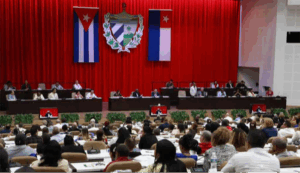 Havana, Cuba.- Deputies of Cuba’s National Assembly of People’s Power have approved the Code for Children, Adolescents, and Youth, legislation aimed at implementing public policies that guarantee their protection and contribution to social development.
Havana, Cuba.- Deputies of Cuba’s National Assembly of People’s Power have approved the Code for Children, Adolescents, and Youth, legislation aimed at implementing public policies that guarantee their protection and contribution to social development.
During the presentation of the law at the Fifth Ordinary Session on Friday, the Minister of Education, Naima Trujillo, explained that more than 200,000 people contributed their opinions in the referendum.
She explained that the temporary group in charge of drafting the law was attended by 28 organizations, institutions, entities, as well as experts, academics, researchers, university professors, and other collaborators.
The code presents references based on the Constitution of the Republic, the Family Code, the Comprehensive Policy for Children, Adolescents, and Youth, the Convention on the Rights of the Child, and other international treaties related to addressing disability, women, gender, skin color, and inclusion.
The minister commented that the normative provision “has been aimed at regulating the full exercise of the rights of children, adolescents, and young people, the fulfillment of their duties, and establishing the institutional framework to guarantee their protection, participation, inclusion, and contribution to social development.”
For its structure, she said, two books were designed to organize the specificities of children and adolescents and those of young people and establish principles, rights, duties, and guarantees.
Naima Trujillo specified that the law strengthens the mechanisms for reporting, addressing, and responding to violations of the rights of these age groups.
At the same time, it defines the system for supporting and promoting youth participation in settings and incentives that recognize them as key players in their own development.
On the other hand, the minister noted, it defines guidelines for the practical application of the principle of the best interests of the child, the evaluation of progressive autonomy, and the creation of protective environments.
It also includes a specialized protection system against violence, with mechanisms for addressing the exercise of rights by children and adolescents, aimed at institutions, entities, and individuals not covered by the Code.
The minister emphasized that the Code establishes two social protection systems: one for children and adolescents and another for youth, with priority given to those in the most vulnerable situations.
Overall, she praised the Code for “inclusion, equity, protection, participation, and humanism.”
She also emphasized that it represents the continued commitment of the Cuban Communist Party, the State, and the Government to guarantee the comprehensive development of children, adolescents, and young people.